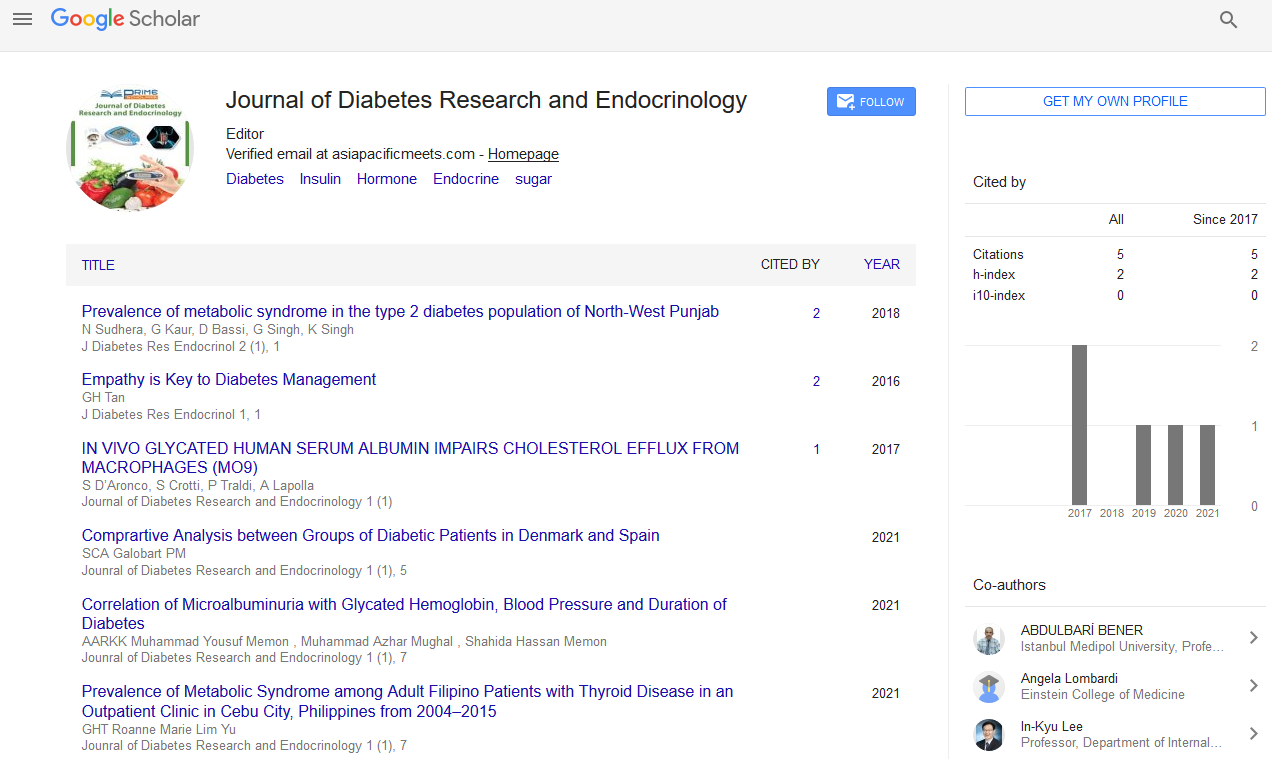Opinion - (2024) Volume 8, Issue 2
Emotional and Psychological Aspects of Gestational Diabetes
Maisie Dixon*
Department of Endocrinology, West of Scotland University, UK
*Correspondence:
Maisie Dixon,
Department of Endocrinology, West of Scotland University,
UK,
Email:
Received: 29-May-2024, Manuscript No. IPJDRE-24-20960;
Editor assigned: 31-May-2024, Pre QC No. IPJDRE-24-20960 (PQ);
Reviewed: 14-Jun-2024, QC No. IPJDRE-24-20960;
Revised: 19-Jun-2024, Manuscript No. IPJDRE-24-20960 (R);
Published:
26-Jun-2024, DOI: 10.36648/ipjdre.08.02.18
Introduction
Gestational diabetes, a condition characterized by high blood
sugar levels during pregnancy, affects approximately 6%-9% of
pregnant women. While much attention is given to the physical
management of the condition, the emotional and psychological
aspects are equally important. The diagnosis and management
of gestational diabetes can evoke a range of emotions, from
anxiety and guilt to frustration and fear. Understanding
these emotional and psychological impacts is crucial for
comprehensive care and support for affected women. The
initial diagnosis of gestational diabetes can be shocking,
especially for women who have no prior history of diabetes
or related health issues. Many women may experience denial,
struggling to accept the diagnosis and its implications. Concerns
about the health of the baby and the potential complications of
gestational diabetes often lead to heightened anxiety and fear.
Women may worry about the risk of birth defects, premature
delivery, and the long-term health of their child. Many women
may feel guilty or blame themselves for developing gestational
diabetes, even though it is largely influenced by hormonal
changes and genetic factors. This guilt can be exacerbated by
misconceptions about the condition being solely a result of
poor lifestyle choices. Managing gestational diabetes requires
significant lifestyle adjustments, including strict dietary changes
and regular blood sugar monitoring.
Description
These changes can be stressful and overwhelming, particularly
for women who are already dealing with the physical and
emotional demands of pregnancy. For some women, the need
for insulin injections can be a source of anxiety. The fear of
needles, potential side effects, and the stigma associated with
insulin use can contribute to psychological stress. The need
for frequent blood sugar testing and constant vigilance over
food intake can lead to feelings of frustration and burnout.
This relentless monitoring can make women feel like they have
lost control over their bodies and pregnancies. Pregnancy
already brings significant changes to a woman’s body, and
gestational diabetes can add to these concerns. Women
may feel self-conscious about their weight gain and physical
appearance, impacting their self-esteem and body image. The
stress of managing gestational diabetes can strain relationships
with partners, family, and friends. Partners may struggle to
understand the emotional and physical toll of the condition,
leading to feelings of isolation and loneliness for the affected
women. The dietary restrictions and lifestyle changes required
to manage gestational diabetes can lead to social isolation.
Women may avoid social gatherings and events where food
is a central focus, further exacerbating feelings of loneliness
and isolation. Women with gestational diabetes are at a higher
risk of developing postpartum depression and anxiety. The
emotional stress of managing the condition during pregnancy
can continue into the postpartum period, impacting the
mother’s mental health and ability to care for her new-born.
The experience of gestational diabetes can lead to a persistent
fear of developing diabetes in future pregnancies or later in life.
Conclusion
Supportive relationships can provide emotional comfort,
practical help, and encouragement during the pregnancy
journey. Practices such as mindfulness, meditation, and yoga
can help manage stress and anxiety. These techniques promote
relaxation and emotional well-being, helping women cope with
the challenges of gestational diabetes. Gestational diabetes not
only affects physical health but also has significant emotional
and psychological impacts. Addressing these aspects is crucial
for comprehensive care and support. Through psychological
counselling, education, support networks, and stress-relief
techniques, women can manage the emotional challenges
of gestational diabetes effectively. By acknowledging and
addressing the emotional and psychological impacts, healthcare
providers can ensure a holistic approach to the management of
gestational diabetes, promoting the well-being of both mother
and baby.
Citation: Dixon M (2024) Emotional and Psychological Aspects of Gestational Diabetes. J Diab Res Endocrinol. 8:19.
Copyright: 2024 Dixon M. This is an open-access article distributed under the terms of the Creative Commons Attribution License, which permits unrestricted use, distribution, and reproduction in any medium, provided the original author and source are credited.

